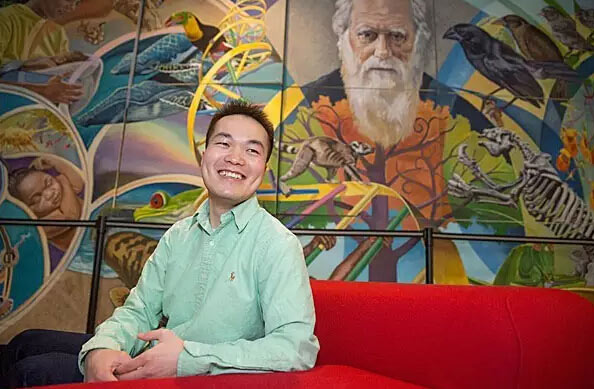當前位置: Language Tips> 名人演講
“從中國邊遠農村一個傳統的農民家庭走出來成為哈佛畢業生是一條很長很長的路。”當地時間5月26日,哈佛大學第365屆畢業典禮在哈佛最古老的校園區Harvard Yard里舉行。今年的畢業典禮備受中國青年學生和家長關注,因為一位來自中國的畢業生何江作為優秀畢業生代表發言,這是哈佛大學給予畢業生的最高榮譽。
When a poisonous spider bit a young Jiang He on the hand, his mother put a chopstick in his mouth, wrapped his hand in wine-soaked cotton, and set the cotton on fire.
當一只毒蜘蛛咬了小何江的手時,媽媽在她嘴里塞了一根筷子,把用酒浸過的棉布裹在他手上,把棉布點燃。
As Jiang explained in his speech, there is some scientific basis for this folk remedy, the only kind available in his native village in China’s Hunan Province. Nevertheless, the searing pain he felt that day drove Jiang to seek out more modern answers in biochemistry.
何江在演講中說,這個土方子有那么點科學道理,這是他湖南農村唯一的治療辦法。然而,鉆心的疼痛讓他開始尋求生物化學領域更為現代的答案。
It was a long way to graduate school at Harvard from the remote, rural village where Jiang grew up in a traditional farming family. The village didn’t get electricity until the 1990s, and the Jiangs continued using oil lamps to save money. They and their neighbors dug their own wells for drinking water.
從中國邊遠農村一個傳統的農民家庭走出來成為哈佛畢業生是一條很長的路。村子里九十年代才通電,他們家還一直煤油燈省電。他們和鄰里靠挖井取水。
“Educational resources were also limited,” said Jiang. He and his brother walked 90 minutes over mountainous terrain to their cheaply built school, which once collapsed in a rainstorm. The math teacher was moonlighting from his primary job as a butcher.
“教育資源也很匱乏。”他和哥哥走90分鐘的山路去一座破爛小學,小學曾在一場暴雨中倒塌。數學老師的主業是屠夫。

“Back then, I could never imagine myself getting out and studying at places like Harvard,” Jiang said. He’d never set foot in a city or used a computer when, in 2005, he entered college, the first in his family to do so.
“那時候,我根本想象不到有一天我能走出來,在哈佛這樣的地方讀書。”2005年上大學時,他從來沒進過城,也沒用過電腦。他是家里第一個上大學的人。
Jiang, who earned his Harvard Ph.D. in molecular and cellular biology, recently became a postdoctoral researcher at Massachusetts Institute of Technology, with his name on studies in The Journal of Cell Biology, The Journal of Experimental Medicine, and other scholarly periodicals.
獲得哈佛分子與細胞生物學博士學位的何江現在在麻省理工大學讀博士后,在《細胞生物學期刊》、《實驗醫學期刊》和其他學術期刊上發表過文章。
His research at Harvard focused on developing single-molecule imaging techniques and applying them to the study of biological processes, especially flu virus infection.
他在哈佛研究單分子影像技術,并將之運用于生物學過程研究,尤其是流感病毒感染。
More generally, Jiang wants to bring advances in medicine to underserved communities such as the one he came from. He hopes the newly minted scientists and doctors in the audience at Commencement will think about how to do the same.
總的來說,他想讓醫療條件不足的地區能取得醫療進展,例如他的家鄉。他希望聽眾中的新晉科學家和醫生也想想能做點什么。
“I have experienced the drastic contrasts of rural and modern life, and have seen how knowledge and technology are unequally distributed,” Jiang said.
“我經歷過農村生活和現代生活的強烈差距,認識到知識和技術的分布如此不均。”
“We could easily help so many people in the underdeveloped world by sharing and communicating the knowledge we have in the modern world to these people. That really motivated me to write the speech and bring this message to the others. [I hope] to trigger Harvard graduates to rethink our mission as we start our next voyage.”
“我們可以向他們分享和傳播現代世界的知識,輕松地幫助不發達世界的很多人。這激勵了我寫下這篇演講,讓大家知道這一點。我希望能讓哈佛畢業生在開始另一段征程前,重新思考自己的使命。”
講者簡介
何江是哈佛大學生物系博士畢業生,本科畢業于中國科技大學。碩士和博士均畢業于哈佛大學,現在MIT作博士后。這次哈佛的畢業演講并不是何江第一次代表優秀學生發言,從中科大畢業時,他曾獲得學校的最高榮譽獎——郭沫若獎學金,并作為獲獎代表發言。
(來源:愛思英語? 編輯:Julie)
關注和訂閱

電話:8610-84883645
傳真:8610-84883500
Email: languagetips@chinadaily.com.cn